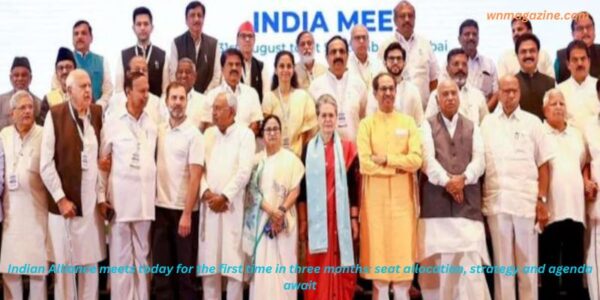On Tuesday, a day following the suspension of opposition MPs from Parliament houses, the INDIA Bloc is set to convene after a hiatus of three months in Delhi. The primary agenda of this meeting is the finalization of seat-sharing arrangements among regional parties, facilitating the selection of candidates and kickstarting campaign activities, including rallies. While the caste census is likely to be on the agenda, the immediate task for the alliance is to reach a consensus on selecting a convener.
Also read : wellhealthorganic vitamin b12
Regional parties decide to finish seat sharing.
The local parties are anticipating the Congress to play a central role in setting the agenda for the meeting. In turn, these regional parties will present their proposals to redefine the collective strategy aimed at countering the BJP, which convincingly outperformed the Congress in recent Assembly elections in Rajasthan, Madhya Pradesh, and Chhattisgarh. Earlier, regional parties had expressed dissatisfaction with the alliance’s momentum being disrupted by the Congress’s focus on Assembly elections in five states.
India Alliance discusses the effective strategy.
According to sources, the alliance members will deliberate on an alternative and effective agenda to counter the BJP, potentially centered around the theme of “Main nahin, hum (not I, we),” a slogan previously employed by the Congress in the 2014 Lok Sabha elections that saw Prime Minister Narendra Modi coming to power.
A leader from the Samajwadi Party (SP) emphasized the need for discussions on seat sharing, highlighting that once seat distribution is finalized, parties can proceed with candidate selection, organizational strengthening, and coordination with allies.
The effect of the difference between Congress and SP
Acknowledging differences between the SP and Congress, the SP leader indicated that leaders from both parties would engage in talks regarding an alliance in Uttar Pradesh ahead of the Lok Sabha polls.
A leader from the Janata Dal suggested that Bihar Chief Minister Nitish Kumar, who initiated efforts to bring parties together earlier, would propose the INDIA bloc to develop a consensus on supporting a caste census. Additionally, suggestions were made for specific parties to lead the alliance in key states, such as the SP and Rashtriya Lok Dal in Uttar Pradesh and the JD(U) and Rashtriya Janata Dal (RJD) in Bihar.
Bihar Deputy CM Tejashwi Yadav mentioned that alliance committees formed earlier were working behind the scenes to prepare for the upcoming polls.
Also Read: wellhealth how to build muscle tag
Conclusion
In conclusion, West Bengal Chief Minister Mamata Banerjee expressed confidence that the alliance members would resolve differences, including those related to seat sharing. She indicated that a three-way alliance involving the Trinamool Congress (TMC), Congress, and others was highly possible in West Bengal.
